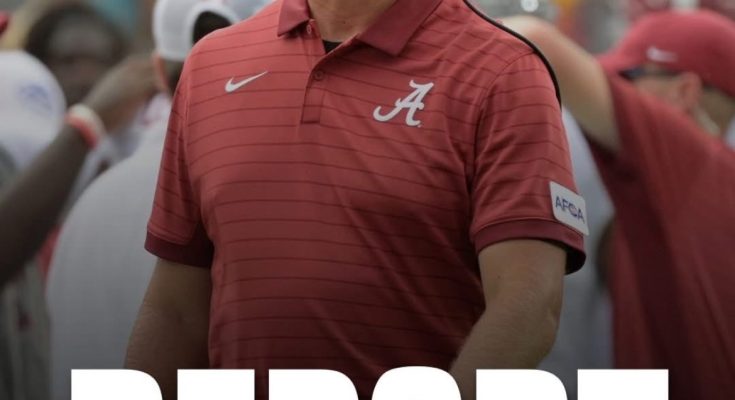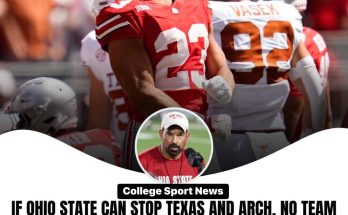A viral moment out of Alabama has taken the internet by storm, blending the worlds of college football passion, lottery fever, and the unshakable loyalty that Crimson Tide fans are known for. The clip that has been making the rounds shows a woman from Guntersville declaring, with full sincerity, that if she were to win the massive $2 billion Alabama Powerball jackpot, the first thing she would do is set aside $70 million to pay off the buyout of Alabama head coach Kalen DeBoer. It is the kind of statement that might sound exaggerated or even tongue-in-cheek to outsiders, but within the cultural context of Alabama football, it resonates on a different level. For many in the state, the Crimson Tide are not just a team but a way of life, and the fact that someone would consider such a move speaks volumes about how deeply embedded the sport is in the community’s identity.
The woman, identified simply as “Susie from Guntersville” in the video, became an overnight sensation because her comment taps into two of America’s greatest obsessions: money and football. A lottery jackpot of that magnitude always generates headlines, but combining it with a bold proclamation about potentially reshaping the future of the Alabama football program was a recipe for viral success. What made the clip particularly fascinating was not just her pledge, but the matter-of-fact way she stated it. There was no hesitation, no playful grin to suggest she was joking. To her, the idea of devoting nearly a tenth of her winnings to buying out a coach was a logical, almost selfless investment in the program she loves.
To understand why such a statement can grip people’s attention, it is important to grasp the sheer scale of Alabama football’s cultural footprint. College football in Alabama is not simply a pastime. It is a religion, with game days serving as weekly pilgrimages. When Nick Saban stepped down and Kalen DeBoer was brought in as his successor, it represented a seismic shift. Saban’s dynasty had set the gold standard for modern college football, and anyone replacing him was stepping into near-impossible expectations. While DeBoer arrived with an impressive résumé, including success at Washington, the Alabama faithful hold their program to the highest of bars. Every stumble, every misstep, and even every style choice is analyzed, dissected, and debated endlessly. In that kind of climate, the notion of one passionate fan willingly pledging lottery winnings to change the coaching staff speaks to the level of emotional investment people have in the team’s direction.
The viral clip sparked a flurry of conversations online, with fans and commentators weighing in. Some saw it as a lighthearted reflection of how seriously Alabama takes football. Others saw it as a satirical snapshot of misplaced priorities, pointing out that $70 million could transform countless communities, fund scholarships, or support public health initiatives in Alabama. But perhaps what has fueled the ongoing buzz is the fact that many within the fan base seemed to rally behind the spirit of her statement, even if not literally endorsing the idea of buying out DeBoer. For fans who have grown up in the golden age of Tide football dominance, the idea of anything less than total superiority is unacceptable. Thus, Susie’s declaration was not just a funny soundbite but a metaphor for the uncompromising standards that Alabama football supporters maintain.
This phenomenon also highlights how intertwined sports are with identity in the South. When fans say “Roll Tide,” it is not simply a cheer for a team. It is a declaration of pride, belonging, and cultural significance. In many towns across Alabama, the University of Alabama football program carries more influence and visibility than state politics, local economies, or other civic institutions. That is why even a hypothetical $70 million buyout resonates with people—it symbolizes the extremes to which fans are willing to go in defense of their team’s legacy.
The clip also offers a window into how modern media amplifies these moments. A decade ago, such a comment might have been confined to a local news story or a small circle of friends. Today, with TikTok, Twitter, Instagram, and YouTube, a comment from a small-town fan can rocket across the country within hours, sparking debates on sports shows and fueling memes across platforms. In an era where viral moments can create instant celebrities, Susie has unintentionally become a folk hero of sorts, embodying the audacious devotion that is both admired and mocked by those outside the Crimson Tide orbit.
From a financial perspective, the notion of a $70 million buyout also illustrates the dizzying sums involved in modern college football. Buyouts, once a relatively modest clause in coaching contracts, have ballooned into astronomical figures. Kalen DeBoer’s buyout is massive, but not entirely unprecedented in today’s climate where elite programs are willing to pay staggering sums to secure or part ways with high-profile coaches. For fans like Susie, these numbers are not abstract—they are tangible goals worth sacrificing imaginary lottery winnings for. That very fact underscores how normalized these enormous figures have become in the college sports landscape.
As for DeBoer himself, the viral story puts him in an awkward position. On one hand, he has taken on one of the toughest coaching jobs in the country, succeeding a legend in Nick Saban, and he deserves time to prove himself. On the other hand, the passion of Alabama fans creates a microscope under which every decision is judged. To see fans casually discussing spending Powerball money to buy him out reflects the enormous pressure he faces. Even though the viral clip may have been delivered in jest, it is also a reminder of the weight of expectations he must carry every season he coaches in Tuscaloosa.
The story also opens a broader discussion about priorities. Critics of the viral video have pointed out that such a declaration is emblematic of how sports can overshadow other pressing societal needs. Alabama, like many states, faces challenges in education, healthcare, and infrastructure. A $70 million investment in those areas would produce measurable improvements in people’s lives. And yet, the fact that such a suggestion about a football coach can gain traction is proof of the sport’s dominance in public consciousness. It raises questions about how communities allocate emotional, financial, and social capital. But for many fans, these critiques miss the point. The declaration was not meant as a literal redistribution of funds, but rather as a symbol of devotion and a humorous, if extreme, expression of loyalty.
What is undeniable is that the viral clip has cemented itself in the cultural memory of the 2025 season. It has already sparked merchandise, memes, and countless online debates. T-shirts bearing slogans like “$70 Million for the Tide” have been spotted at tailgates, and sports radio callers bring up the video regularly when discussing Alabama’s season outlook. For Susie, what began as a candid moment may have unexpectedly made her one of the most recognizable fans in college football this year.
In many ways, the viral moment perfectly encapsulates the intersection of modern sports fandom, digital culture, and the financial realities of big-time college athletics. It is humorous, absurd, and yet deeply telling. It shows how the lottery, a symbol of outsized dreams and impossible odds, merges with college football, a sport that thrives on outsized expectations and legendary figures. Together, they create a story that captivates because it feels uniquely American: the dream of unimaginable wealth being tied not to personal luxury but to communal pride in a football program.
As the Powerball numbers continue to rise and Alabama’s season unfolds under DeBoer’s leadership, the viral story will likely fade into the backdrop of sports chatter. But it will not be forgotten. It will serve as a reminder of how a single offhand comment can ignite a conversation about what matters most to people in certain parts of the country. And it underscores that in Alabama, football is more than just a game. It is a commitment that fans are willing to back with their words, their emotions, and even their hypothetical lottery winnings.
The fascination with this viral video ultimately comes down to relatability in a strange way. Everyone has thought about what they would do with a massive lottery win. Some dream of paying off debt, buying houses, or traveling the world. Susie’s dream, however unconventional, is a reflection of her priorities: investing in the team she loves above all else. Whether people laugh at it, shake their heads at the extravagance, or nod in admiration of her devotion, the fact remains that her words touched a nerve. They reveal not only her passion but also the enduring truth that sports have the power to inspire grand, sometimes irrational, declarations. And in a world that often feels divided, that shared passion—even when expressed in viral soundbites—can bring people together in conversation, debate, and community.
In the end, the story of Susie from Guntersville is about more than a lottery ticket or a coaching buyout. It is about how fans dream, how they express their love for the game, and how sports culture has evolved into a space where even the most outlandish statements can feel plausible. Whether Kalen DeBoer’s tenure proves long and successful or short-lived and tumultuous, this viral moment has already secured its place in the tapestry of Alabama football lore. And should the Powerball indeed land in Susie’s favor, the entire nation will be watching to see if she keeps her bold promise to spend $70 million ensuring the future of the Crimson Tide.



